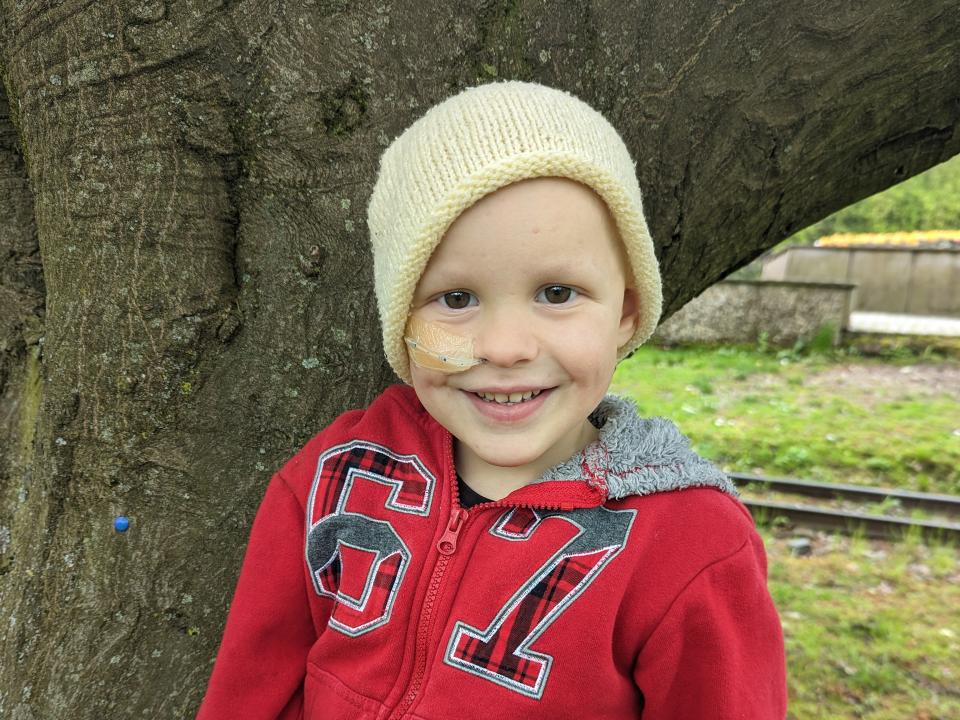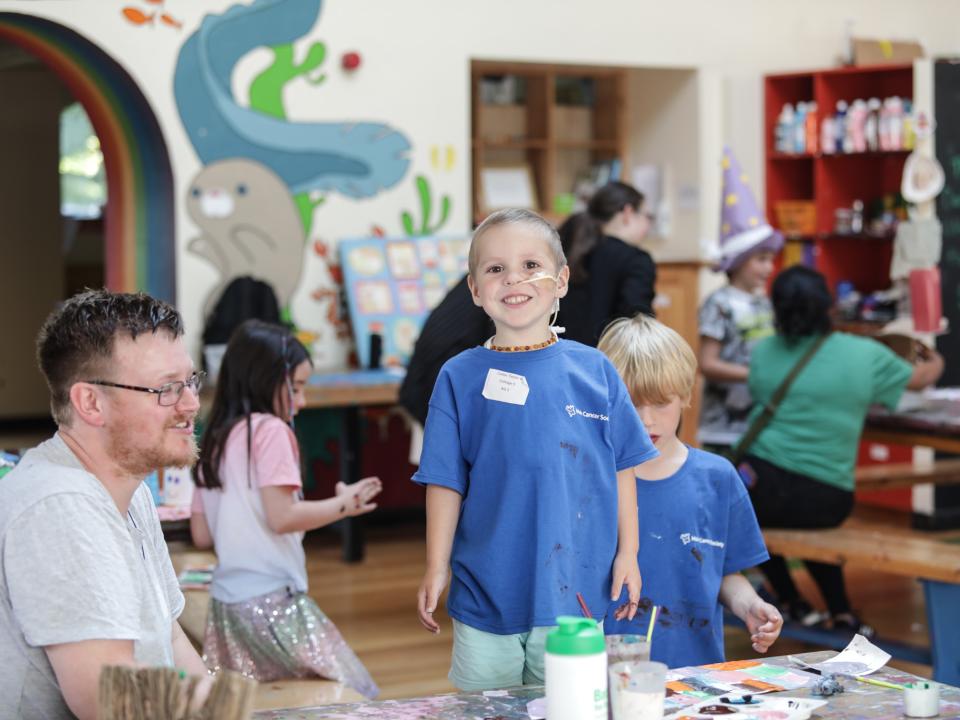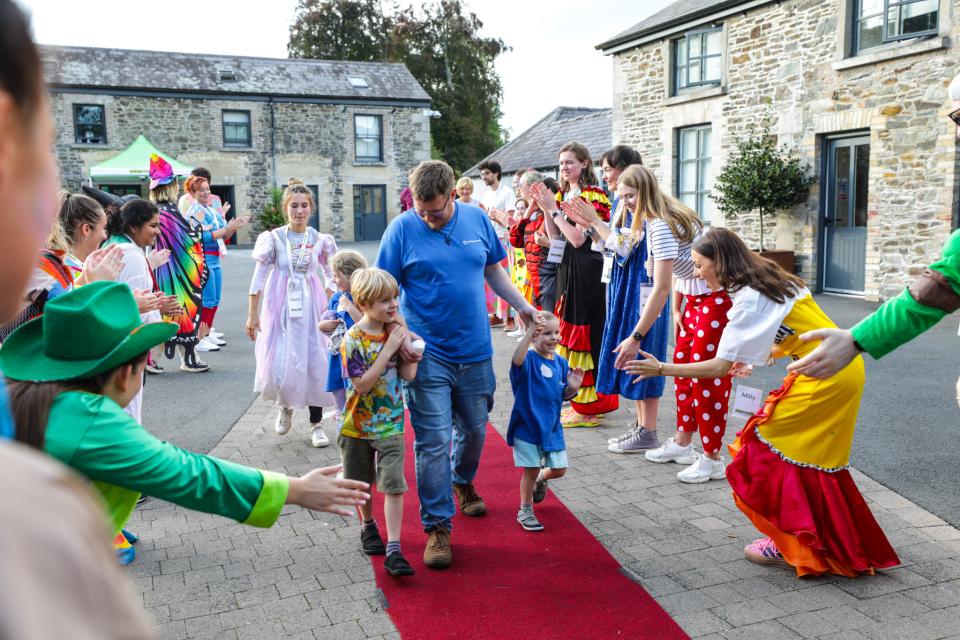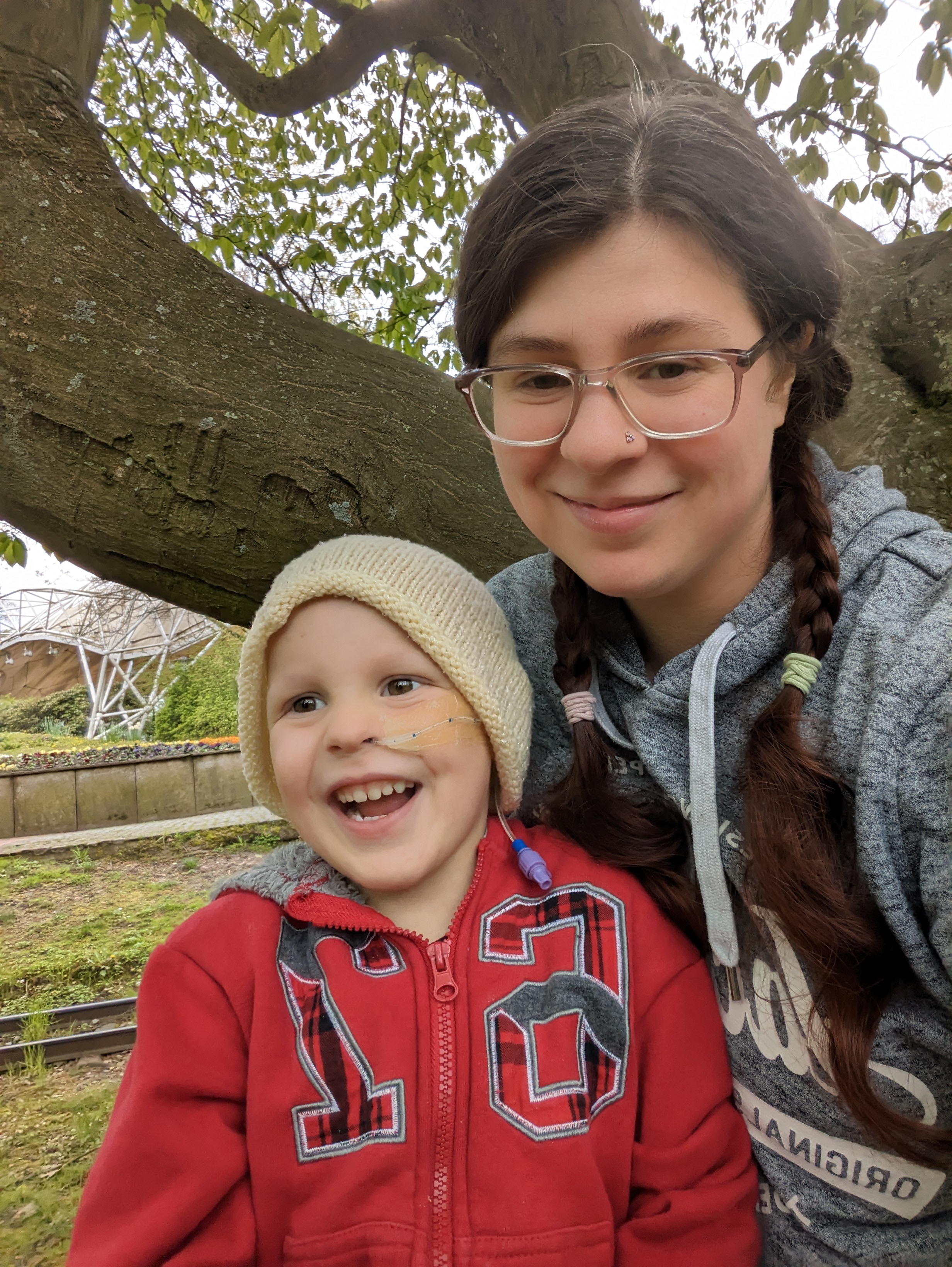
In November 2022, after a run-of-the-mill fall by her 3-year-old son, Abigail became worried when she noticed veins and bruising around his right upper leg. “The spider veins and bruising were unusual, but I thought it was just from the fall. I said to myself, ‘Keep an eye on that, and see if it goes away.’ That week, Cadoc went away for mid-term break with his siblings and their dad, and when they came back, his leg was noticeably swollen, and the veins were coming out around his thigh and groin area. “These symptoms, combined with the fact that their dad told me he had been really tired all week and hardly eaten made me more concerned. I tried unsuccessfully to get hold of an out-of-hours doctor right away – this was a Sunday.”
After a referral from her GP to the Emergency Department the next day, and a number of tests and scans, an ultrasound of Cadoc’s pelvis and abdomen found a tumour. “On 8 November 2022, we went to the hospital and by 6 pm, we found out he had cancer. It’s hard to describe the feeling when you get told that news – I went into absolute shock. It’s every parent’s worst nightmare. I’d say every parent has had the ‘what ifs’ about their kids, but you put them aside. You think childhood cancer is so rare, it won’t happen to us, but it did.”
Cadoc was immediately transferred from their local hospital to Our Lady's Children's Hospital in Crumlin. It was a further nine days before Cadoc’s diagnosis was fully confirmed. Cadoc was diagnosed with rhabdomyosarcoma, a muscle tissue cancer. “Once we knew what we were dealing with, we were immediately into chemotherapy. It was a rapidly growing tumour – in the space of nine days, it had grown to the extent that Cadoc was in severe pain when urinating because it had grown into his bladder. He could no longer walk because of the severe swelling of his leg and groin.”
"You think childhood cancer is so rare, it won’t happen to us, but it did.”

Cadoc was immediately transferred from their local hospital to Our Lady's Children's Hospital in Crumlin. It was a further nine days before Cadoc’s diagnosis was fully confirmed. Cadoc was diagnosed with rhabdomyosarcoma, a muscle tissue cancer. “Once we knew what we were dealing with, we were immediately into chemotherapy. It was a rapidly growing tumour – in the space of nine days, it had grown to the extent that Cadoc was in severe pain when urinating because it had grown into his bladder. He could no longer walk because of the severe swelling of his leg and groin.”
Treatment brought a scare for Cadoc. “He got his first chemo in the evening and went straight asleep, but he didn’t wake up as normal the next day. He was let sleep it off and it was just put down to fatigue, but by 10 or 11 am, the doctors were concerned, and he was unresponsive. He had to be woken up using methylene blue – a specific medicine that acts as an antidote to the chemotherapy, which helped Cadoc to wake up. There were concerns about brain damage, but these were thankfully ruled out pretty quickly by scans. He was then put on a different chemotherapy for the next few doses. As he needed the higher-strength chemo, they eventually put him back on his original one, but in combination with the methylene blue, and he was monitored closely for reactions. There were no real scares from that point.”
Towards the end of Cadoc’s chemotherapy, it was clear that the chemo hadn’t shrunk his tumour enough for his medical team to remove it. “His tumour had reduced by 75%, but it was close to vital organs, nerves and blood vessels to his legs, and you need a certain amount of healthy tissue around the tumour for a successful surgery. All of this meant we had to go abroad for a special kind of radiotherapy to try shrink Cadoc’s tumour further.”
In late April 2023, Abigail and her family spent six weeks in Germany with the support of the Gavin Glynn Foundation. Cadoc was there for daily proton beam therapy, which requires a general anaesthetic, plus his last two rounds of chemo. “This was so draining for Cadoc – he really struggled. You had the chemo nausea, the radiotherapy nausea and then you had the fasting before he was put under for the proton therapy. We obviously wanted to make sure he was getting as many nutrients as possible – he’s still a growing child – so it was really tough on him.”
Thankfully, by the end of May, Cadoc’s tumour had shrunk, and the family returned home for rest and recovery. On 7 July, Cadoc was able to have his surgery to remove his tumour in time to get home for his fourth birthday. “He was such a trooper throughout everything. He’s so young, he doesn’t understand how sick he has been. When we were trying to talk him through it, he just took it all in his stride.”
Facing such a traumatic experience has taken its toll on Abigail and Cadoc, but also on her other children and their dad Adam, and her partner. “It’s been exhausting. It’s hard to put it into words just how drained you feel. I need to be there for Cadoc, but I also tried to keep my other kids’ lives as normal as possible. We haven’t been able to do that; I know this whole experience has been incredibly hard for them. My eldest daughter is attending play therapy at the Solas Cancer Support Centre in Waterford, and as soon as another play therapist becomes available, we’ll get my other son in there too. Then there’s the questions they ask: ‘Is my brother going to die?’; ‘Can I get cancer?’; ‘Will his cancer come back?’ You want to validate their fears and try answer their questions, but you don’t want to worry them”.
Abigail and her partner don’t drive, so getting from A to B has proved challenging. “We have had huge community support from family and friends dropping us to and from appointments, as well as the school runs. But there’s a limit to what people can do, and you don’t want to keep asking for or expecting that support. We’ve had to take taxis to a lot of appointments and that’s been difficult financially, as well as the cost of occasional childcare. There were also a lot of bus tickets to and from Dublin in those first few weeks in hospital while Adam, his dad, and I took turns being in Crumlin with him, and Adam has struggled with missing work a lot as well."
Abigail successfully applied for Carer’s Allowance, but she points out the fact that this State support is not backdated to when the full-time care began. “I just thought that was a little tough to take. My family’s world has been turned upside-down, and my head didn’t immediately go to ‘let’s get the paperwork ready to apply for Carer’s Allowance’. By the time we applied, it was almost six weeks later but we got nothing by way of financial support for all that time.”
Abigail’s family availed of the Irish Cancer Society’s Children’s Fund, a dedicated grant of €3,000 to the families of children in cancer treatment. “This was hugely helpful and alleviated some of the financial pressures we were facing – it just gave us an extra bit of breathing room.”
Once Cadoc’s tumour was removed, doctors found that there were still live cancer cells despite his intensive treatment. “So, he still needs to be on maintenance chemotherapy – we don’t know for how long, six months to a year. That involves going up to Crumlin Children’s Hospital once a week, and me giving Cadoc oral chemo every day. We’ve had to rely again on the goodwill of people to take us there and back. Sometimes we've had to take public transport, which is just a horrible experience with a very sick child because you’re frightened he’ll pick something up.”
“This was hugely helpful and alleviated some of the financial pressures we were facing – it just gave us an extra bit of breathing room.”
Reflecting on her experience of Cadoc’s cancer journey, Abigail says she is encouraging any family impacted by cancer to reach out and ask for support. “My message is don’t be afraid to ask for help. I have availed of the Irish Cancer Society’s counselling service and found it be really helpful – it's important to be able to talk to somebody about what you’re dealing with. You need to be aware of the impact it will have on your mental and physical health. I encouraged others in my family to take up the free counselling, which I found invaluable.”
“While we’ve had huge support, if people are wondering how they might help [a family going through a cancer journey], you could drop over a meal, or even stop by for a chat and a cup of tea. Outside of medical professionals and people from charities, I would say I can count on two hands the number of people I’ve had conversations with in the last year. You need that break; you need to be able to have different conversations with people.”

Finally, Abigail’s three children, including Cadoc attended the Irish Cancer Society’s Family Camp at Barretstown in early September. “It was great for them to spend time together and leave the worry behind for a fun family weekend. Their dad took them, and they can't stop talking about all the activities they got to do.”

